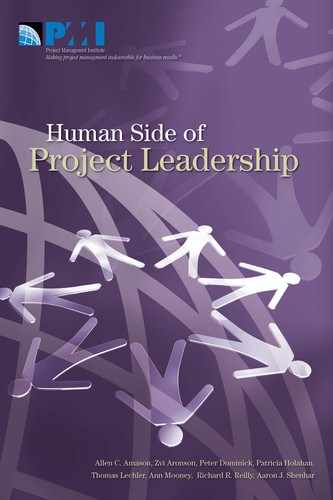CHAPTER 14
Theoretical Development
Cognitive conflict occurs when team members offer and debate differing viewpoints about the tasks at hand (Jehn 1995). This exchange of ideas allows teams to synthesize their perspectives into decisions that are superior to any individual team member’s perspective (Korsgaard, Schweiger, and Sapienza 1995). As a result, cognitive conflict has been found to improve decision making by encouraging greater cognitive understanding of issues, higher quality decisions, and greater affective acceptance and understanding of the decisions reached (Amason 1996), which in turn, improves group performance (Jehn 1997).
The other form of conflict, affective conflict, is different from cognitive conflict because it involves team members disagreeing about issues that are more emotional and personal in nature, such as power struggles or personal incompatibilities (Jehn 1995). Researchers have found that these debates lead to undesirable outcomes, such as lower quality decisions, less affective acceptance of decisions (Amason 1996), and decreased satisfaction and performance (Jehn 1997). Thus, effective conflict management requires teams to gain the benefits of cognitive conflict while avoiding the costs of affective conflict (Amason and Sapienza 1997).
The problem is that cognitive and affective conflict are difficult to separate (Amason and Mooney 2000). Teams that experience cognitive conflict also tend to experience affective conflict (Amason 1996; Amason and Sapienza 1997; Jehn 1994, 1995; Pelled 1996).
Unraveling Cognitive and Affective Conflict
In an effort to understand how teams can stimulate cognitive conflict but avoid affective conflict, researchers have sought to identify the various factors that relate to conflict in the first place. Indeed, by identifying antecedents that relate positively to cognitive conflict, but negatively to affective conflict, guidance might be given for how teams can manage conflict.
Three basic sets of attributes—team, task, and organization—have been explored by researchers as possible antecedents of conflict. Team attributes refer to the characteristics of team members (for example, diversity). Task attributes refer to the nature of the work or project(s) to which a team is assigned. And organizational attributes refer to the nature of the organization, including its culture, processes, and strategies. These sets of determinants have all been found to have a strong impact on conflict (Amason and Sapienza 1997; Amason and Mooney 1999; Pelled, Eisenhardt, and Xin 1999).
The problem is, however, that researchers have been unable to identify factors that relate positively to cognitive conflict while relating negatively to affective conflict. In fact, with a few exceptions (for example, Pelled 1996), researchers have been generally unable to identify factors that even relate differently to cognitive and affective conflict. For example, a team’s openness to disagreement (Amason and Sapienza 1997; Jehn 1995) has been found to promote both forms of conflict, while value consensus, value fit (Jehn 1994), mutuality (Amason and Sapienza 1997), prospector strategies (Mooney and Sonnenfeld 2000), and task routineness (Pelled, et al. 1999) have been found to degrade both cognitive and affective conflict.
An Alternative Approach to Unraveling Cognitive and Affective Conflict
An alternative approach to understanding how cognitive and affective conflict can be separated and managed effectively is to more deeply explore the relationship between the two forms of conflict. Rather than treating cognitive and affective conflict as separate dependent variables, as most researchers have done, value might be added by considering how and why the two forms of conflict relate to one another.
Researchers have alluded to an empirical link between cognitive and affective conflict. As Amason and Sapienza (1997) explain, what starts as cognitive debates tends to spiral into more affective debates, because task-related disagreements can become emotionally charged; and team members take disagreements more personally. For example, the finance manager might misconstrue the perspective of the marketing manager as being motivated by a personal agenda. When this happens, cognitive debate turns sour and personal disagreements and tension emerges, resulting in affective conflict.
Researchers, however, have yet to empirically consider this possible mutation from cognitive to affective conflict. Such consideration is important because by missing this theoretical link, we lack a full understanding of how cognitive and affective conflict can be separated and managed effectively. Specifically, the previous findings that team, task, and organizational antecedents relate similarly to both forms of conflict may be due to the fact that by promoting (or discouraging) cognitive conflict, these factors also promote (or discourage) affective conflict; since the cognitive conflict is promoted by these factors, it, in turn, sparks affective conflict. In other words, it may be that cognitive conflict mediates the relationship between team, task, and organizational determinants and affective conflict.
